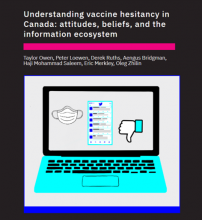
Canadians will see less politics on Facebook during election | CBC News
August 18, 2021 | Facebook and other social media companies have done a lot over the past five years to address the problem of their platforms' being used by bad actors to influence elections or spread misinformation. However, they still have a way to go.

McGill University Launches Canadian Election Misinformation Project
FOR IMMEDIATE RELEASE

Understanding vaccine hesitancy in Canada | Media Ecosystem Observatory
The Max Bell School's Media Ecosystem Observatory is out with a new research paper on vaccine hesitancy in Canada.
Some of the key findings:
Sixty-five percent of Canadians intend to take a vaccine, with some slight erosion since a high in July. Approximately 15 percent of Canadians are unwilling, and an additional 20 percent are unsure.

Americans are super-spreaders of COVID-19 misinformation | McGill Newsroom
April 6, 2021| The mis- and dis-information that fills many corners of the American media ecosystem is having an affect on Canadians' perceptions of the COVID-19 pandemic, according to research from Professor Taylor Owen and other McGill academics. The McGill Newsroom has the full story.
Read the news release.

Variation in the Canadian Provincial and Territorial Responses to Covid-19 | Blavatnik School
In collaboration with Oxford University's Blavatnik School and Institute for Research on Public Policy and its Centre of Excellence on the Canadian Federation, Max Bell School alumni and Policy Scholar Paisley Sim co-authored a wor

Platform Responsibility and Regulation in Canada | Jolt Digest
This new research from Sonja Solomun, Maryna Polataiko, and Helen A. Hayes of the Centre for Media, Technology and Democracy delves into key considerations for the regulation of internet platforms in Canada.
Read the note here.

How to fix the patchwork system of paid sick leave in Canada | IRPP
April 23, 2021 | In our fragmented federal system, policies on issue like paid sick leave can vary drastically from province to province. The COVID-19 pandemic has shone a light on the problems with such disparities.

New report on protecting democratic expression online | Public Policy Forum
Supported by the Max Bell School's Centre for Media, Technology and Democracy, the Canadian Commission on Democratic Expression has released a new report detailing six recommendations to enable citizens, governments and platforms to deal with online hate speech in Canada.

Advancing Human Protection Through Multilateralism | PeaceLab Blog
February 2, 2021 | As the tide of nationalism sweeps across the globe and countries increasingly turn inwards, it is crucial that the protection agenda–including the Protection of Civilians (PoC) and the Responsibility to Protect (RtoP)–is reaffirmed. Max Bell School Professor Jennifer Welsh writes on the PeaceLab Blog about what measures Germany can take to achieve this objective, including embracing multilateralism and seeking out new partners to promote civilian self-protection.

Understanding vaccine hesitancy in Canada: attitudes, beliefs, and the information ecosystem
December 2020 | This new report by the Media Ecosystem Observatory looks into vaccine hesitancy in Canada in the lead-up to the development of a vaccine. Key findings included that 65% of Canadians intend to take a vaccine, and that the best opportunity to reach those who are unsure is to address important concerns around the safety and effectiveness of the vaccine.

The political and security dimensions of the humanitarian health response to violent conflict
January 24, 2021 | In this paper, Max Bell School Professor Jennifer Welsh and her co-authors address the challenges and opportunities the fluid geopolitical and security environment poses for humanitarian policymaking and practice.
Read the paper.

Mind the gaps: Integrating Human Rights and sustainable development goals into evaluation practice
Max Bell School Professor Pearl Eliadis has authored the chapter Mind the Gaps: Integrating Human Rights and Sustainable Development Goals into Evaluation Practice inThe Realpolitik of Evaluation, a recently published book edited by Markus Palenberg an Arne Paulson.

Rethinking Quebec’s Support for Electric Vehicles
In this report for the Quebec government, our Director Christopher Ragan with the support of MPP students Matis Allali, Ruhee Ismail-Teja, Riad Katkhoda & Charlotte Reboul examine how terminating electric vehicle subsidies can strengthen Quebec's climate policy.
Read the report

New Centre for Media, Technology and Democracy launched at McGill University’s Max Bell School of Public Policy
The Centre is McGill’s focal point on critical research and public debate about the role of media and emerging technologies in shaping democracy and public life

Reframing Canada’s Global Engagement: A Diagnostic of Key Trends and Sources of Influence
This report, co-authored by Max Bell School Professor Jennifer Welsh, begins by summarizing a number of features of Canada’s population, economic power, and geographic and political position, which continue to call for international engagement.
Section Two then provides a strategic assessment of the current global environment and the most significant risks it poses to Canada’s interests and values.


